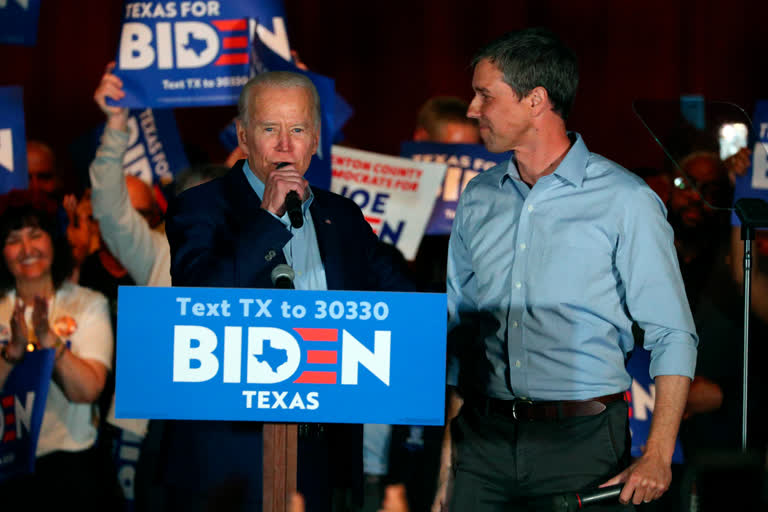Washington: Joe Biden scored key Super Tuesday victories in Minnesota and across the South, building on the momentum that has swiftly revived his Democratic presidential campaign in recent days. Bernie Sanders countered with wins in his home state of Vermont and Colorado, as the race began to shift west, where some polls were starting to close.
Biden took Alabama, Arkansas, Tennessee, Oklahoma and the battleground states of North Carolina and Virginia, a strong start as 14 states went to the polls across the nation. Still, voting was ongoing in the two top prizes, Texas and California — meaning the night's biggest winner remained unclear.
The victories in heavily African American states complemented the former vice president's resounding win in last weekend's South Carolina primary. Virginia was especially key because Sanders, a Vermont senator and billionaire former New York Mayor Mike Bloomberg heavily contested it over the past week.
A once-jumbled race arrived at the most pivotal night of the primary as an increasingly well-defined battle between leftist Democrats who back the likes of Sanders and Massachusetts Sen. Elizabeth Warren and centrists preferring Biden. A wild card had been Bloomberg who skipped the primary's first four states but poured more than USD 500 million of his fortune into TV advertising in Super Tuesday states.
Read Also:Virus alarms sound worldwide, but China sees crisis on decline
As the night wore on, the former mayor appeared to have little to show for all that spending, though. And he was planning to fly to New York to reassess his campaign, according to a person close to his operation who spoke on condition of anonymity to describe internal deliberations. That will leave Warren facing increased pressure to rethink her campaign and may ultimately result in the race winnowing to Biden and Sanders, two white men in their late 70s. It would be a dramatic evolution for a Democratic field once celebrated for so many women and candidates of color.
A measure of good news for Bloomberg came in the U.S. territory of American Samoa where he took five of its six delegates with the final one going to U.S. Rep. Tulsi Gabbard of Hawaii. That wasn't enough to make up for his struggles elsewhere, though.
Two other moderates, Minnesota Sen. Amy Klobuchar and Pete Buttigieg, the former mayor of South Bend, Indiana, both left the race in the run-up to Super Tuesday, then endorsed Biden on Monday. That helped unify moderates behind the former vice president whose campaign risked collapsing until South Carolina.
Biden's continued turnaround would be all the more surprising because Super Tuesday was supposed to be about monster fundraising and strong political organization across such a large swath of the country. Biden largely had neither and yet still looked to be having a strong night. Sanders, an avowed democratic socialist, argued that the party's elders were scrambling to block him from a nomination it appeared just last week he could run away with.
“The political establishment has made their choice: Anybody but Bernie Sanders,” Sanders campaign manager Faiz Shakir wrote in a fundraising message on Tuesday.
“The truth is, we’ve always known we were taking on the entire damn 1 percent of this country," Shakir added. “But we have something they do not have: people. Lots and lots of people.”
For Sanders, Super Tuesday 2020 was beginning to look a bit like the 2016 campaign when Hillary Clinton racked up delegates from Southern states as the Vermont senator struggled to connect with black voters. During his second campaign, Sanders has made a concerted effort to improve his standing with minorities nationwide and his campaign remains optimistic about heavily Hispanic California where he's predicted victory.
